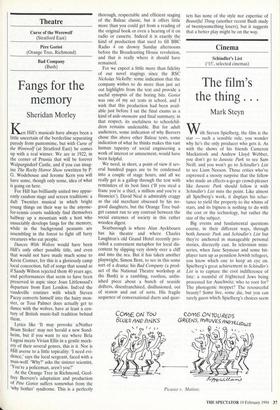Theatre
Curse of the Werewolf (Stratford East) Pere Goriot (Orange Tree, Richmond) Bad Company (Bush)
Fangs for the memory
Sheridan Morley
lien Hill's musicals have always been a little uncertain of the borderline separating parody from pantomime, but with Curse of the Werewolf (at Stratford East) he comes up with a real winner. We are in 1922, in the corner of Prussia that will be forever Walpurgisdorf Castle, and if you can imag- ine The Rocky Horror Show rewritten by P. G. Wodehouse and Jerome Kern you will have some, though only some, idea of what is going on here.
For Hill has brilliantly united two appar- ently random stage and screen traditions: a daft Twenties musical in which bright young things on their way to the anyone- for-tennis courts suddenly find themselves halfway up a mountain with a host who unsociably develops fangs for the memory, while in the background peasants are assembling in the forest to fight off furry creatures who eat people.
Dances With Wolves would have been Hill's only other possible title, and even that would not have made much sense to Kevin Costner, for this is a gloriously camp local concoction, full of songs that sound as if Sandy Wilson rejected them 40 years ago, and performances that seem to have been preserved in aspic since Joan Littlewood's departure from East London. Indeed the vaudeville routines with which Steven Pacey converts himself into the hairy mon- ster, or Toni Palmer does actually get to dance with the wolves, have at least a cen- tury of British music-hall tradition behind them.
Lyrics like `It may provoke a/Nother Bram Stoker' may not herald a new Sond- heim, but if you want to see where Bela Lugosi meets Vivian Ellis in a gentle mock- ery of their several genres, this is it. Nor is Hill averse to a little topicality: 'I need evi- dence,' says the local sergeant, faced with a man-wolf. `Why?' asks the sinister scientist, `You're a policeman, aren't you?'
At the Orange Tree in Richmond, Geof- frey Beevers's adaptation and production of Pere Goriot suffers somewhat from the `why bother' syndrome. This is a perfectly thorough, respectable and efficient staging of the Balzac classic, but it offers little more than you could get from a reading of the original book or even a hearing of it on radio or cassette. Indeed it is exactly the kind of production that used to fill BBC Radio 4 on drowsy Sunday afternoons before the Broadcasting House revolution, and that is really where it should have remained.
For we expect a little more than fidelity of our novel stagings since the RSC Nicholas Nickelby: some indication that the company wishes to do more than just act out highlights from the text and provide a useful synopsis of the boring bits. Goriot was one of my set texts in school, and I wish that this production had been avail- able just before I sat the final exams as a kind of aide-memoire and final summary; in that respect, its usefulness to schoolchil- dren remains undeniable. But for adult audiences, some indication of why Beevers chose this above other Balzac texts, some indication of what he thinks makes this vast human tapestry of social engineering a work of interest or amusement, would have been helpful.
We need, in short, a point of view if sev- eral hundred pages are to be condensed into a couple of stage hours, and all we really get is a gallop through the text with reminders of its best lines (`If you steal a franc you're a thief, a million and you're a financier'). David Neal is admirably craggy as the old merchant obsessed by his no- good daughters, but the Orange Tree bud- get cannot run to any contrast between the social extremes of society in this rather wooden digest.
Scarborough is where Alan Ayckbourn has his theatre and where Charles Laughton's old Grand Hotel recently pro- vided a convenient metaphor for local dis- content by slipping very slowly over a cliff and into the sea. But it has taken another playwright, Simon Bent, to see in this some sort of a drama: his Bad Company (a prod- uct of the National Theatre workshop at the Bush) is a rambling, rootless, unfin- ished piece about a bunch of seaside drifters, disenfranchised, disillusioned, out of season and out of sorts. His fragile sequence of conversational duets and guar- tets has none of the style nor expertise of Beautiful Thing (another recent Bush study of twentysomething losers), but it suggests that a better play might be on the way.


















































 Previous page
Previous page